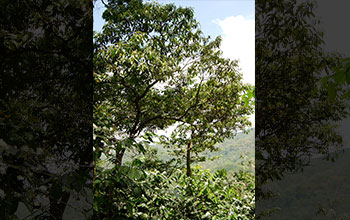Multimedia Gallery
Shade-coffee Farms Support Native Bees (Image 3)
A Miconia affinis tree growing within a shade-coffee farm in Chiapas, Mexico. M. affinis is a small, native understory tree that many farmers allow to invade their shade-coffee farms because the trees help control soil erosion. [Image 3 of 3 related images. Back to Image 1.]
More About This Image
A research study by Christopher Dick, an assistant professor of ecology and evolutionary biology at the University of Michigan (U-M), and Shalene Jha, a colleague at the University of California, Berkeley, at the time, suggests that by pollinating trees on shade-coffee farms and adjacent patches of forest in Mexico, native bees help preserve the genetic diversity of remnant native tree populations.
Each year, an estimated 32.1 million acres of tropical forest are destroyed to make room for crops, pasture for grazing animals and logging. Coffee crops, which cover more than 27 million acres of land in many of the world's most biodiverse regions, are often grown adjacent to remnant forest patches.
But in Latin America over the past 30 years, coffee farmers have switched from the traditional shade-grown method where plants are grown beneath a diverse canopy of trees, to sun-coffee, a process that involves thinning or removing the canopy. Studies show that shade-grown farms increase biodiversity. Not only do they provide shelter for migrating birds, non-migratory bats and other species, but they require far less synthetic fertilizer, pesticides and herbicides than sun-coffee farms.
For the study, supported in part by the National Science Foundation (NSF), Dick and Jha examined the role of native bees that pollinate native trees in and around shade-grown coffee farms in the highlands of southern Chiapas, Mexico, and area where tropical forest now represents less than 10 percent of the land cover.
"A concern in tropical agriculture areas is that increasingly fragmented landscapes isolate native plant populations, eventually leading to lower genetic diversity," said Dick. "But this study shows that specialized native bees help enhance the fecundity and the genetic diversity of remnant native trees, which could serve as reservoirs for future forest regeneration."
To read more about the study, see the Science Daily news story Shade-coffee Farms Support Native Bees That Maintain Genetic Diversity in Tropical Forests. [Research supported by NSF grant DEB 09-08661.] (Date of Image: 2008)
Credit: Shalene Jha, University of California, Berkeley
Images and other media in the National Science Foundation Multimedia Gallery are available for use in print and electronic material by NSF employees, members of the media, university staff, teachers and the general public. All media in the gallery are intended for personal, educational and nonprofit/non-commercial use only.
Images credited to the National Science Foundation, a federal agency, are in the public domain. The images were created by employees of the United States Government as part of their official duties or prepared by contractors as "works for hire" for NSF. You may freely use NSF-credited images and, at your discretion, credit NSF with a "Courtesy: National Science Foundation" notation.
Additional information about general usage can be found in Conditions.
Also Available:
Download the high-resolution JPG version of the image. (3.1 MB)
Use your mouse to right-click (Mac users may need to Ctrl-click) the link above and choose the option that will save the file or target to your computer.

